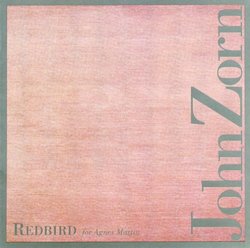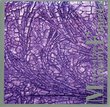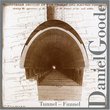| All Artists: John Zorn, Emanuel, Jaffee, Friedlander Title: Redbird Members Wishing: 3 Total Copies: 0 Label: Tzadik Release Date: 9/19/1995 Genres: Dance & Electronic, Jazz, Special Interest, New Age, Classical Styles: Ambient, Avant Garde & Free Jazz, Experimental Music, Historical Periods, Modern, 20th, & 21st Century Number of Discs: 1 SwapaCD Credits: 1 UPC: 702397700821 |
Search - John Zorn, Emanuel, Jaffee :: Redbird
 | John Zorn, Emanuel, Jaffee Redbird Genres: Dance & Electronic, Jazz, Special Interest, New Age, Classical
|
Larger Image |
CD DetailsSimilar CDs
|
CD ReviewsSolid work from one of today's masters: john zorn 06/27/2000 (5 out of 5 stars) "i have followed john zorn and his musical output for over ten years, and he keeps on amazing and satisfying me. whatever he plays and/or writes, classical string quartet - freejazz klezmer - orchestral works - ambient stuff - full on hardest metal, he simply is very good at. he seldom gives interviews, but when he does he openly talks about people who have influenced him and his music, and expresses his appreciation for them. morton feldman might well be amongt those influences. the opening track here "dark river" is an excellent bass drums - pitched very, very low - only piece. to fully appreciate it you probably need a good stereo system. the 2nd track (40+ minutes) is very ambient-ish, nothing much seems to be happening, there are only very subtle changes some people will not hear when giving it a first listen - it is after a while that you'll discover the beauty of this piece. if you like this cd, then also give zorn's "duras:duchamps" a go." Subtle and serene Steward Willons | Illinois | 09/20/2008 (5 out of 5 stars) ""Redbird" is atypical for Zorn, a composer whose name is virtually synonymous with warp-speed collage and bizarre juxtaposition. Even in his postmodernist art music, his ideas tend to assault your ears in rapid succession. This is, without a doubt, the single most minimal release of Zorn's career. Each piece, "Dark River" and "Redbird" are built from the smallest of fragments and allowed to sustain in the listeners ear for a considerably amount of time. The first piece, "Dark River," is scored for four bass drums, played with very soft mallets - soft to the point that the listener cannot discern individual attacks. These are not rock 'n roll bass drums, but symphonic bass drums, full of incredible resonance. The effect is something like thunder in the distance. Jim Pugliese, a frequent Zorn collaborator, turns out a very transparent performance. As the music washes over you, it's easy to forget the musician behind the sounds, as they are so effectively evocative. The piece lasts for almost nine minutes and offers little in the way of timbral variety, but that's not really the point. When you have a rich, warm texture, sometimes it's great to just experience it in total serenity without distraction. The second piece, "Redbird," is clearly Zorn's tribute to Morton Feldman. He does so not only in duration, but also in style and in instrumentation. It's not a "minimalist" work per se. It doesn't really have anything to do with the minimalist (or process music) of Steve Reich and Philip Glass, and it seeks to do something else entirely. That said, I suppose one could say that the work is built from a minimum of elements. Those familiar with Feldman's music will immediately think of "Durations", as the instrumentation is almost the same, with the addition of harp and wood block. The basic harmonic motive is different though. Feldman seemed to favor block chords in odd configurations, designed to produce a lot of minor seconds, which he would then stagger between the musicians to produce a kaleidoscopic effect. Instead, Zorn uses slightly more conventional chords that appear mostly in unison. This is a significant difference and probably my main criticism of the piece. If Feldman had composed these same pitches, he would have had a more interesting rhythmic scheme. I think the perceptually simple rhythmic scheme that Zorn uses makes "Redbird" seem longer than it really is. Even if the number of pitches is extremely small, there is plenty going on, if you know what to listen for. The repeated chords show up in different configurations, and in different instruments. I'm assuming there's something cyclical happening, but I haven't tried to map it all out. In a way, I think that's beside the point anyway. Zorn needs a compositional system to arrive at something that works. But we, as listeners, need only sit back and let the music wash over us. You could listen on a more technical level, but the real power comes from the mood it creates - mystery, with a veiled optimism. These two works are quite long, for what we usually expect from Zorn, and with the amount of restraint used on this CD, some fans may find it difficult and unrewarding. I'm sure most Zorn fans know better than to approach a new CD with any sort of "expectations", but this may be more than they anticipate. I find it a very rewarding album, but I can also see how some may not enjoy it. Hopefully I've given sufficient description that you can decide if it sounds interesting or not. Listen to the 30-second sample. Then imagine that times 80 and you've got a reasonable idea of what to expect." Objection jjmmkk | Millbrook, NY | 09/02/2007 (3 out of 5 stars) "I just heard Redbird on the radio. In fact only a part of it. But found it sufficiently beguiling that I am ordering it right now. On such brief acquiantance there is little I can say about it other than to state that it does NOT sound like Morton Feldman... well perhaps in an extremely superfical way it does, but that is about the extent of it. It's unfair to both composers to make this a significant point of catagorization."
|

 Track Listings (2) - Disc #1
Track Listings (2) - Disc #1


